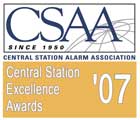

From left: Laura Stepanek, SDM editor; Rick Cahill, recipient of the Central Station Operator of the Year award; John A. Murphy, CSAA president; and in the background, Steve Doyle, executive vice president of CSAA.
The awards, sponsored bySDMMagazine, recognize any UL-listed station, and applicants are not required to be CSAA members. The purpose of the awards is to promote the value of central station services, honor those who have made significant contributions to the industry and promote the level of professionalism of UL-listed central stations.
“The whole idea behind the awards is to recognize those central stations and their employees that go that extra mile and that go above and beyond the typical standards of the industry,” says Steve Doyle, executive vice president of CSAA.
The awards are divided into three categories: Central Station of the Year; Central Station Operator of the Year; and Central Station Manager of the Year. A separate judging panel appointed by CSAA’s Awards Subcommittee of the Education Committee judged the entries.

From left: Laura Stepanek, SDM editor; M.J. Vance, recipient of the Central Station Manager of the Year award; John A. Murphy, CSAA president; Steve Doyle, executive vice president of CSAA.
Martha Johnson, a lead central station operator at CenterPoint Technologies, St. Louis, says regarding this year’s Central Station Manager of the Year, M.J. Vance, receiving the honor, “I have worked for several alarm companies in the past 27 years and, of all of the managers, M.J. is the best. I hope I retire before she does, because she makes you want to come to work!”
CSAA plans to continue recognizing the excellence of companies and employees that make up the alarm industry’s central stations for years to come. “[We] hope that in the future, the application process for the awards will serve as a guide to central stations, central station managers and central station operators as to what constitutes ‘excellence,’” Doyle says.
Read on to learn about the recipients of the 2007 Central Station Excellence Awards.
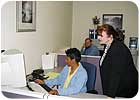
M.J. Vance oversees day-to-day operations at CenterPoint Technologies’ St. Louis-based central station.
Central Station Manager of the Year
M.J. Vance of CenterPoint Technologies prides herself on customer service and a motivated, happy team of employees.You won’t find M.J. Vance riding a Harley into the office, though she does tinker with building her own motorcycles and currently owns three. “It’s hard to wear leathers to a business meeting,” she jokes.
Choppers are not the only things that Vance, this year’s Central Station Alarm Association’s Central Station Manager of the Year, builds. Vance builds teams — and she has spent the last four years building a world-class central station monitoring team at CenterPoint Technologies, St. Louis.
Under Vance’s direction, the third-party monitoring center serves 17,500 subscribers, about 60 percent of whom are residential and 40 percent are commercial. Vance works hard to keep strong relationships with CenterPoint’s dealer customers, as well as forging new relationships with other dealers. “I do make at least weekly calls to the dealers,” Vance says. “Some of them, I talk to more than once a day.”
Although Vance started her career in the security industry at another St. Louis central station about six years ago, where she worked for a little less than two years, her background in management is long and varied. From providing customer service at a national airline carrier to running a hotel, to owning her own restaurant, Vance’s management skills helped her earn the trust and respect of her CenterPoint team.
“I stepped into my previous job as central station manager without knowing anything about alarms. But I did know how to run an operation, and that got me through some hurdles,” she recalls.
Vance started fielding signals her third day on the job at CenterPoint because the monitoring center was a bit short on operators, and she wanted everyone to know she was a “team player.”
“I always try to emphasize that we are in the communications business. You are communicating with the dealer, the end user, other staff or police,” Vance says.
When Vance came onboard at CenterPoint, she established dispatch time guidelines. Team member average talk time became less than 60 seconds per call.
Standards for taking action on fire signals became no more than 30 seconds. Action time on burglar alarm signals became no more than 60 seconds. Today, Vance can brag that CenterPoint’s average action time for burglar alarm signals is 18 seconds and for fire signals is 10 seconds.
Being one of the best also means keeping operators happy and motivated and providing them with the proper training to do their job, believes Vance. “We have training classes and monthly tests. She keeps us educated and aware,” says Sharon Keeley, an operator at CenterPoint. “The job can be chaotic and stressful, and she takes care of us.”
Vance became a SIA Instructor in July 2004 to train her staff. In addition, she made sure all operators were CSAA Level 1 certified. Recently, Vance ensured that all operators achieved Level 2 certification. The central station also received Five Diamond Certification in June 2006 from CSAA.
“There is nothing I would rather be doing. My team members, the staff, all of us are sharing this experience, because they are the ones that really got me this award,” concludes Vance about being Central Station Manager of the Year.
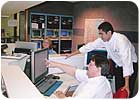
As lead supervisor/trainer at Alarm Detection Systems Inc., Aurora, Ill., Rick Cahill has a hand in training all new central station employees.
Central Station Operator of the Year
Rick Cahill of Alarm Detection Systems Inc. demonstrates dedication to the industry and a knack for educating others.It was July 1996 and the rain started falling in northern Illinois. The 43-centimeter total storm rainfall in Aurora, Ill., was the greatest point rainfall recorded for storm durations of 24 hours or less in the 20th century for Illinois and several surrounding states.
Rick Cahill, lead supervisor and trainer at Alarm Detection Systems Inc. (ADS), Aurora, Ill., was getting ready for bed. He knew it was raining — just not how much it was actually raining. “At around 2 a.m. the phone rang, and it was Bob Bonifas [president and CEO of Alarm Detection Systems]. He said he was in dire need of operators, as nobody could seem to make it into the central station,” recalls Cahill.
“I jumped in my car and drove around. I couldn’t get there because of all the water, so I turned around and went home,” he adds. He tried driving again, however, and this time found a way into ADS’ central station. Normally it takes Cahill about 10 minutes to get to work. That day it took nearly two hours, and it wasn’t because of traffic.
Cahill stayed at the central station for 48 hours with the rest of the operators that were already in the building. Nobody else could get in. Even some techs were taking calls, remembers Cahill. “In the first 24 hours, there were more than 6,000 alarm signals that came in,” he adds. “Everybody came together, and we really worked as a team.”
During Cahill’s 18-year tenure at ADS, he’s faced plenty of other challenges, including responding to tornadoes and fires. One of Cahill’s biggest assets on the job, and perhaps part of the reason he was honored with this year’s Central Station Operator of the Year award, is his ability to work well under pressure, says Rick Raper, central station manager at ADS. “He is able to work well under pressure and with very high volumes,” Raper says. “He doesn’t freak out, and he tries to teach the other operators to react calmly.”
Cahill’s supervisors saw his natural talent to lead and teach, and Cahill found himself fall into the role of trainer for the monitoring center, which serves approximately 26,000 subscribers. “I started working with all the new trainees, and eventually was given that position,” Cahill explains. Cahill is a SIA-certified instructor, and is CSAA Level 1 and 2 certified. Last July, Cahill also made sure each and every one of the operators at ADS were Level 2 certified. ADS was the first central station to achieve this – “an accomplishment I’m very proud of,” he says.
In addition to formal training modules and quality assurance audits, Cahill tries to lead the other operators at ADS by example. He stays in the monitoring center with the rest of the operators each day, and loves to jump in and help field calls whenever necessary.
“I love teaching, and I love taking care of people and protecting them and their property. I try to teach all of our operators to handle alarms as they would if it was their family or another family member,” he relates. “If we make the customer happy, we make everyone happy, including ourselves.”
Central Station of the Year
Diebold offers clients customized, tailored solutions for each of its niche markets.Diebold serves customers in three central station locations. The company’s Event Monitoring Center (EMC) located in Uniontown, Ohio (the other two are in Hawaii and Mexico), manages more than 35,000 customers with 33 operators — and all but 96 of those customers are commercial subscribers. Diebold’s Ohio-based EMC is the recipient of this year’s CSAA Central Station of the Year award — and the company has achieved its success by focusing on niche markets and offering a flexibility needed and demanded by its large, national customer base.
Diebold’s niche markets include government, financial, retail and commercial, and the company has focused on such markets since 1859, says John Stroia, vice president of government and monitoring solutions. “The types of solutions we’ve offered have changed. We weren’t in the monitoring business, for example, then, but today we offer that across all markets,” he explains.
Meeting the Customer’s Needs
A Five Diamond Central Station, Diebold focuses on providing its customers with personalized services and relationships, as well as meeting the needs of each customer in each market. “Our strategy is not to bring one offering to our customers. We listen and come up with a unique solution for each customer,” Stroia says.As a central station that serves national customers, large businesses and government departments, Diebold has strived to prove its commitment to the business by staying on top of certifications and qualifications, including UL-listings, security clearances and industry recognitions.
“From a requirement perspective, dealing with larger accounts, you have to have a relationship-type of selling environment to be successful. We take a consultative approach to selling. We listen to the customer’s needs and provide a customized solution for each customer,” says Steve Ipson, director of monitoring services at Diebold.
“We figure out what is appropriate for each customer by listening to the concerns and their corporate security strategy,” says Jacky Grimm, director of security solutions — monitoring center. Grimm explains that for Diebold, a banking customer might have larger security concerns while open, such as hold-ups. However, a large retail customer may be more concerned with security while closed, focusing on burglaries or break-ins. Each of their security concerns helps Diebold personalize the services and instructions it uses at the EMC.
In addition to different security concerns or needs, practical issues, such as security clearances or certifications, come up as well — particularly when dealing with government customers — and Diebold has risen to the occasion to make sure it can play in this market.
Diebold has ensured that certain operators in the EMC have the right levels of security clearance to be able to handle government signals.
“There are also certain encryptions or technologies that we have to use, and certain types of reporting required. It was an investment to get the qualifications and certifications to get into the government market. We made that investment, and there are not many companies who have done that,” Stroia says.
To help keep its customers happy, Diebold’s EMC has devised a number of programs and practices. Dedicated employees work as a special C.A.R.E. (Customer Account Representative of the EMC) team and act as direct liaison with each and every customer.
Diebold also has a program in place called “Red, Yellow and Green,” “just like a traffic light,” explains Ipson. A customer is assigned a color, and the color-coding helps operators and EMC employees be advised if a customer needs particular care or handling.
For example, if a customer is unhappy about a situation, they may be flagged as yellow. If a customer is coded red, this tells EMC employees that it is a high-profile, highly visible customer, and that the employee needs to do everything he or she can to take care of that customer and address any concerns or questions.
Employee Focus
Like many central stations, Diebold believes in helping keep its employees happy by providing them with the proper training to do their jobs well.Diebold’s central station engages in many reward programs for employees. One such program is a volunteer group called “The Pride Patrol,” which brainstorms different activities to bring to central station employees each month. Events might include puzzles, games or catered meals.
In order to keep those employees and have “next to no” attrition at the central station, according to Grimm, the company began working with a staffing agency to pre-qualify and test potential operators.
“About five years ago, we were getting a lot of turnover. We asked the staffing agency to pre-qualify and test potential employees following the specific skills and tendencies we wanted in a candidate,” Ipson recalls.
In fact, the new hiring process worked so well, according to Diebold’s management, that the company had to create more upward movement opportunities for loyal employees. “We’ve created opportunities within the center for advanced roles and responsibilities to help,” comments Dennis Moriarty, senior vice president of global security.
A mentoring program was rolled out at the beginning of this year to help create that movement and keep employees educated and interested. “Individuals who meet certain performance criteria are eligible to participate in the mentoring program. If a [central station employee] has an interest in marketing or sales, we will help guide them where they can go and see what happens day-to-day in that job,” Ipson says.
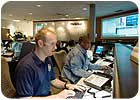
Diebold received Five Diamond Certification in 2003 from the Central Station Alarm Association.
A Mark Above the Rest
World-class companies stay on top of technologies and changes in the industry, and Diebold makes a commitment to stay ahead of the game. About two years ago, when looking at a disaster recovery requirement, Diebold decided to move to a paperless system across the company. In addition to being a part of the disaster recovery effort, the switch greatly improved Diebold’s operational efficiency as well.Another change Diebold made a few years ago was switching to a digital voice recording system at the EMC for all incoming and outgoing phone calls. The EMC had a previous recording system, but moving to digital audio recorders made it possible to use sound clips for more than just quality and internal audits. Sometimes the clips are even used as a courtesy, to send a customer a file of a particularly outstanding dispatch, says Mark Burnett, manager of the EMC. Diebold calls this its “Good News” program.
“So many people never talk to their customers unless something bad is happening. This is a way to communicate in a positive light,” Ipson adds.
Moving Forward
Diebold only plans to improve its operations in the future, with one eye on flexibility and another on service. With a global reach as Diebold has, the company is poised for growth. “Diebold has an infrastructure that few can match. We have 4,500 technicians out there — we have our own global logistics center, our own training center and a customer response center,” Stroia says.“We can work with those larger companies that are expanding into different states or becoming global. They are looking for a company that can grow globally with them,” Ipson says.

Sidebar: Central Station Manager of the Year
Name:Mary Jo (M.J.) VanceCompany:CenterPoint Technologies, St. Louis
Title:Operations Manager/Central Station Manager
Tenure at the company:approx. 4 years
Tenure in current position:approx. 4 years

Sidebar: Central Station Operator of the Year
Name:Rick CahillCompany:Alarm Detection Systems Inc., Aurora, Ill.
Title:Lead Supervisor/Trainer
Tenure at company:18 years
Tenure in current position:10 years
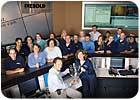
Sidebar: Central Station of the Year
Company:DieboldLocation:Uniontown, Ohio
Number of subscribers:35,000+
Percent commercial subscribers:99 percent


